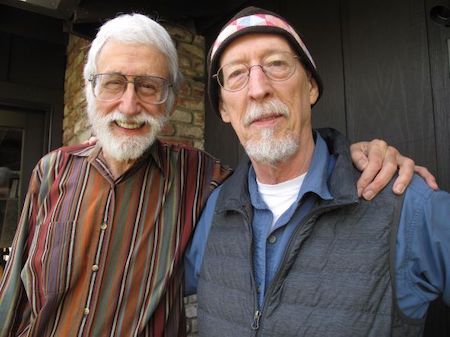Jan 13, 2026 2:09 PM
More Trump-Kennedy Center Cancellations
The fallout from the renaming of the John F. Kennedy Center for the Performing Arts to include President Donald…

Denny Zeitlin and George Marsh
(Photo: Josephine Zeitlin)Denny Zeitlin is equally known for his solo piano work and his trio, which currently includes bassist Buster Williams and drummer Matt Wilson. Since 2015, Zeitlin and drummer George Marsh have also released three acoustic-electric duo albums; the latest is Telepathy (Sunnyside), which lives up to its title.
Sourced from a regular series of recorded improvisational sessions at Zeitlin’s Double Helix Studio in San Francisco’s North Bay Area, the album finds the pianist on his Steinway grand, multiple electronic keyboards and three iPads, and Marsh on an acoustic drum kit. At times, it sounds as though a bassist or percussionist sat in, but “the ‘bass guitarist’ is Denny, and the percussionist is me,” Marsh said, with a chuckle, during a Zoom interview with the two artists.
Though both are from Illinois — the 83-year-old Zeitlin is a Chicago native, while 80-year-old Marsh was born and raised in Belleville, about 300 miles southwest — the two didn’t meet until after they migrated westward.
“I had been recording in an acoustic modern jazz framework for Columbia for a number of years,” Zeitlin said. “And I was getting really hungry to find out what electronic music could do for what I was hearing in my head. And so when George appeared on the scene, here was a guy, he could do it all. Mel Graves was the bassist who we connected with. And for a decade the three of us made a lot of interesting music together.”
Zeitlin and Marsh began recording at Double Helix in 2013. Marsh jokes that he makes the 45-minute drive from Santa Rosa, California, for gourmet cooking by Zeitlin’s wife, Josephine, and selections from the hosts’ wine collection.
In the studio, the pair can’t see one another while playing, so they rely on the “telepathy” they’ve built on the bandstand and the road.
“We want to have good separation for recording, so there are heavy-duty tarps that are hung in between where the drumset is and where all my keyboards are,” Zeitlin explained. “We’re wearing headsets, and we’re dependent on just what we can hear. There are no visual signals about when to stop or take a solo — just our rapport that’s driving the music.”
Overdubbing is rare once the performance is captured, with Zeitlin adding a solo “when I didn’t have enough hands to play certain things I was hearing,” he said. And even those are usually first takes. “That’s the whole beauty of it,” Marsh said. “If we did spend a lot of time overdubbing, it would only cancel out what we were actually doing in real time, which wasn’t squeaky clean.”
The studio nature of the project means that it likely won’t ever be performed live. Zeitlin and Marsh recalled touring with early electronic keyboards in the late ’60s. It required six hours to set up before a performance and six hours to tear down. While keyboard and synthesizer technology has become more compact, Zeitlin doesn’t envision moving his “mission control” setup of instruments and computers.
And the fact that these initially improvised, stylistically diverse pieces won’t ever have to be performed offers creative freedom. “We don’t need to consider what we need to play for a certain audience or venue,” Marsh noted. “We don’t have to think about it, because we don’t do that.”
But they do need to title and sequence these spontaneous compositions. Though they collaborate, both agree that Zeitlin is better at naming the pieces while Marsh excels at determining the order in which they’ll be presented. “Denny’s the master of those titles, man — ‘Boiling Point’ and ‘Disagree To Agree,’ for example,” Marsh said.
“We’re not thinking of any titles while we’re playing,” Zeitlin added. “So afterward, it’s often a feeling of, how can you come up with a word to describe something that seemed to go through so many feelings and places? I’m always worried that title is going to limit someone’s experience of the piece. Yet the solution of it all would be ‘Number One,’ ‘Number Two,’ ‘Number Three’ — and that’s so sterile.
“I think that’s a description of what our musical association has always been about: We’re co-explorers,” Zeitlin concluded. “And that’s really what we do.” DB

Belá Fleck during an interview with Fredrika Whitfield on CNN.
Jan 13, 2026 2:09 PM
The fallout from the renaming of the John F. Kennedy Center for the Performing Arts to include President Donald…

Peplowski first came to prominence in legacy swing bands, including the final iteration of the Benny Goodman Orchestra, before beginning a solo career in the late 1980s.
Feb 3, 2026 12:10 AM
Ken Peplowski, a clarinetist and tenor saxophonist who straddled the worlds of traditional and modern jazz, died Feb. 2…

The success of Oregon’s first album, 1971’s Music Of Another Present Era, allowed Towner to establish a solo career.
Jan 19, 2026 5:02 PM
Ralph Towner, a guitarist and composer who blended multiple genres, including jazz — and throughout them all remained…

Rico’s Anti-Microbial Instrument Swab
Jan 19, 2026 2:48 PM
With this year’s NAMM Show right around the corner, we can look forward to plenty of new and innovative instruments…

Richie Beirach was particularly renowned for his approach to chromatic harmony, which he used to improvise reharmonizations of originals and standards.
Jan 27, 2026 11:19 AM
Richie Beirach, a pianist and composer who channeled a knowledge of modern classical music into his jazz practice,…